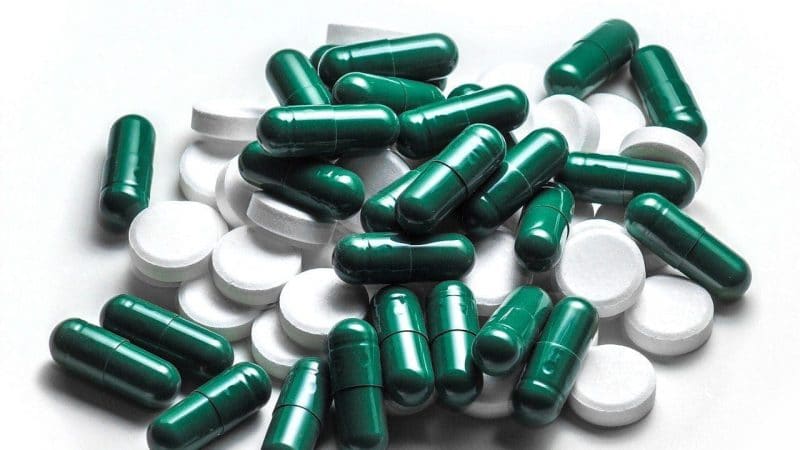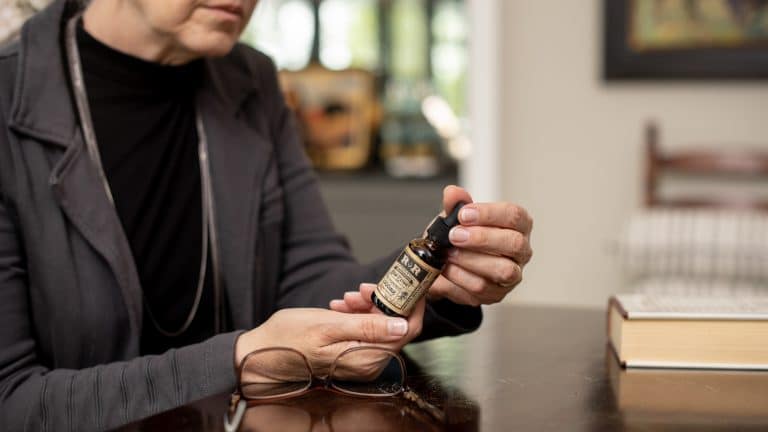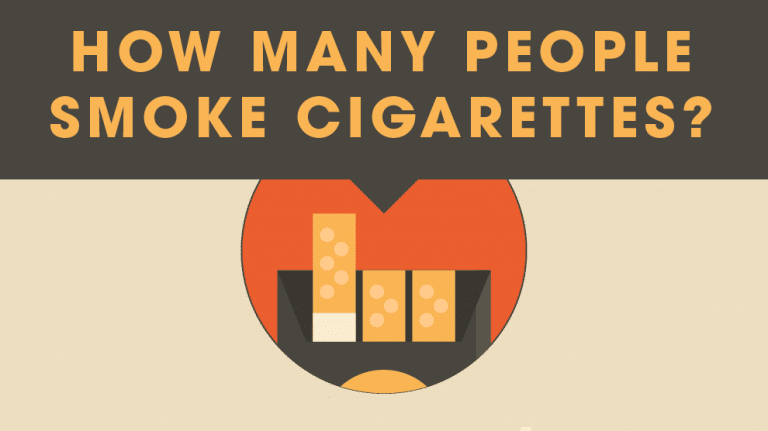Most Common CBD Drug Interactions and Side Effects

It’s perfectly natural to be concerned about possible CBD drug interactions and their side effects.
Seeing how 66% of adult Americans take one or more prescription drugs and that 25% consumed cannabis in one year, there’s bound to be some overlap between the two.
That’s why reading up on all the essential information regarding how CBD and other medications interact in the human body should be a number one priority when consuming weed.
Before we present the extensive CBD drug interaction list, let’s talk a little about CBD itself.
What Is CBD?
CBD (cannaabidiol) is a phytocannabinoid found in cannabis along with 113 other cannabinoids.
When people say that CBD is everywhere, they mean it. You can find CBD in consumer products like cosmetics, drinks, even food. Other uses for CBD oil include relief for countless medical conditions, like migraines, autism, mental disorders, and MS, to name but a few.
Another factor that contributes to the popularity of CBD is the fact that, unlike THC, CBD is non-psychoactive. Meaning there is no such thing as a CBD high (even though it does feel different).
How Can CBD Oil Interact with Medications?
CBD can inhibit the activity of cytochrome P450 — a family of liver enzymes that metabolize toxins and certain medications (CBD included) that enter the human body.
CBD can temporarily block the regular function of these enzymes, causing some drugs in the system to break down more slowly.
Thus, it can increase the amount (and potency) of these medications in the system, as well as the risks of possible side effects and medication interactions.
Moreover, some serious complications can occur in some cases of drug interactions with cannabis, like bleeding and hemorrhages, and even respiratory system issues.
In other instances, CBD can also speed up the performance of some of the enzymes in this group, which in turn speeds up the metabolism of certain drugs. What does this mean? The levels of these drugs in the system are lower and, thus, less effective.
Cannabidiol is not the only one blocking CYP450. Grapefruit and grapefruit juice also show the same effects as drug interactions with CBD oil do. In fact, CBD is just as powerful as bergapten — the most potent inhibitor of liver enzymes found in grapefruit.
The main difference between the two is that you can find grapefruit warnings listed on most medications, unlike CBD. In short, if you see that you shouldn’t use a particular drug with grapefruit, it’s a safe bet that you shouldn’t use it with CBD either.
Other substances like watercress and St. John’s Wort might produce a similar effect when combined with certain drugs.
What Drugs Should Not Be Taken with CBD?
The list can get quite extensive as almost 60% of the drugs on the market are broken down in the body through the liver, i.e., through CYP450.
Nevertheless, the most common medications that you shouldn’t use in unison with CBD (isolate, broad, or full-spectrum) include:
- Anti-epileptic and anti-seizure drugs
- Statins
- Blood thinners
- Antidepressants
- Nonsteroidal anti-inflammatory drugs (NSAIDs)
- Muscle relaxants
- Sedatives (benzodiazepines)
- Beta and calcium channel blockers
- Chemotherapy medication
Consulting a professional on what medications interact with CBD oil is crucial before mixing these drugs with cannabidiol.
This list does not include all the drugs that interact with cannabidiol, nor does it mean that combining any of these types of medication will cause issues when taken with CBD.
The severity of the reaction will depend on the amount of time the drugs have been in your system, as well as some pre-existing medical conditions or allergies.
Anti-Epileptic or Anti-Seizure Drugs and CBD
We start CBD oil drug interactions talk with drugs used to treat epilepsy and seizures. Mixed with cannabidiol, they can lead to severe consequences due to these medications interacting with marijuana.
CBD and Clobazam
This is particularly true of clobazam, which can have serious interactions with CBD. Clobazam (Onfi) is used in combination with other medicines to control seizures, particularly the ones caused by Lennox-Gastaut syndrome, a rare form of epilepsy among children.
This drug is metabolized by the liver enzymes that CBD blocks, resulting in major CBD drug interactions.
Simply put, when used together, the effects and side effects of clobazam increase. This could lead to many adverse effects, such as dizziness, constipation, drowsiness, breathing problems, and even depression and suicidal thoughts.
CBD and Valproate
Valproate is the other of the two drugs that are known to cause major interactions with CBD. In addition to epilepsy, you can use valproic acid to treat some mental conditions and migraines.
Valproic acid could cause severe, even life-threatening liver damage, usually within the first six months of therapy. This medication also has some intense CBD hemp oil drug interactions. The combined use of valproate and cannabinoid oil could increase the risk of liver damage.
CBD and Eslicarbazepine
Another anti-seizure drug known to interact with CBD is eslicarbazepine (Aptiom), although it’s less severe than the previous two.
It can be used alone or with other drugs to treat focal seizures (seizures that affect only one hemisphere of the brain) in adults and children by reducing the number of attacks.
Eslicarbazepine can lead to moderate drug interactions with CBD. Cannabidiol use could slow down the metabolism of eslicarbazepine in the body and thus increase the drug potency in the system, but only by a small degree.
CBD, Topiramate, and Zonisamide
CBD also has a similar effect on topiramate (Topamax) and zonisamide, which are used to treat epilepsy. Likewise, the former is also said to increase some CBD oil effects, like stress reduction. It could also enhance some CBD oil side effects, such as drowsiness and sleepiness.
CBD and Statins
Statins are drugs that reduce cholesterol levels in the body and, in that way, help reduce the risk of heart attacks and strokes.
Atorvastatin and simvastatin are some of the most commonly prescribed cholesterol-lowering medications. Used in combination with a proper diet, atorvastatin lowers bad cholesterol and fats in the body and “improves” HDL, or good cholesterol in the blood.
Statins are known to interact with CBD. So, if you want to avoid serious CBD drug interactions, don’t use them both frequently.
In atorvastatin interactions with CBD, CBD oil use can increase the serum concentration of atorvastatin and simvastatin, which results in them staying in the system for longer and causing dangerous accumulation.
Unlike these two drugs, there is no proof that other statins, like for example, pravastatin and rosuvastatin, can be affected by cannabidiol.
Blood Thinners and CBD
What prescription drugs should not be taken with CBD oil? Definitely, warfarin, rivaroxaban, and apixaban.
Warfarin treats existing blood clots and prevents new ones from forming. It also interacts with cannabidiol. How?
Warfarin is metabolized by the CYP2C9 enzyme, the same one that CBD is said to block. The combination of these two drugs is particularly harmful as it can lead to severe bleeding and thrombosis.
Other blood thinners such as rivaroxaban and apixaban increase the likelihood of side effects. At the same time, some medications like heparin and edoxaban have not shown any significant interaction with CBD.
Does CBD Oil Interact With Blood Pressure Medications?
CBD oil can reduce the efficacy of blood pressure medications regarding hypertension. In a similar manner, blood pressure medications can potentially reduce CBD’s effectiveness.
Cannabidiol is an inhibitor of the cytochrome P-450 enzyme system, so you should be careful when mixing CBD oil with medications for high blood pressure like metoprolol and amlodipine.
Although negative interactions between blood pressure medications and CBD oil are rare, stay cautious and consult with your doctor.
The most common interactions of mixing blood pressure medication and CBD oil are:
- CBD and Amlodipine besylate — CBD could metabolize slower when combined with Amlodipine besylate.
- CBD and Valsartan (Diovan) — CBD will metabolize slower when mixed with Valsartan.
- CBD and Lisinopril — Lisinopril’s antihypertensive function may decrease if you combine it with CBD oil.
- CBD and Metoprolol — its antihypertensive function can decrease if mixed with CBD oil.
- CBD and Hydrochlorothiazide — Hydrochlorothiazide’s antihypertensive function can decrease if mixed with CBD oil.
So, does CBD interfere with blood pressure medicine? Yes, CBD can interact with blood pressure medications. It can also be risky for some people because CBD has anticoagulant effects. In other words, it can thin the blood.
Furthermore, since CBD can lower blood pressure, mixing it with other drugs can be dangerous for individuals who suffer from certain medical conditions.
For example, a 2020 study shows that CBD can improve blood flow because it widens blood vessels. Another study from 2017 shows that CBD can reduce blood pressure in individuals under stress.
CBD Oil and Thyroid Medication Interactions
CBD oil can help with various thyroid dysfunctions, like thyroid storm, hypothyroidism, goiter, hyperthyroidism, and thyroiditis.
However, since both substances compete in the cytochrome P450 pathways to get metabolized, mixing them can lead to various side effects, from hyperthyroidism to mild nausea and anxiety.
Moreover, if you mix CBD with thyroid medication, their interaction can potentially result in subtherapeutic effects. This means that the medicine will stop being effective. The mentioned interaction can also cause toxic levels of the drugs in the bloodstream.
Can You Take CBD Oil With Antidepressants?
Doctors prescribe antidepressants for various psychiatric and psychological disorders, from OCD and attention deficit hyperactivity disorder to stress and anxiety.
Their primary function is to correct neurotransmitters’ chemical imbalances in the brain responsible for mood and behavior swings.
There are five main types of antidepressants:
- SSRIs (selective serotonin reuptake inhibitors)
- SNRIs (serotonin-noradrenaline reuptake inhibitors)
- NASSAs (noradrenaline and specific serotonergic antidepressants)
- TCAs (tricyclic antidepressants)
- MAOIs (monoamine oxidase inhibitors)
CBD oil drug interactions can reduce the effectiveness of some antidepressants, like SSRIs (Prozac and Zoloft) and SNRIs (Effexor and Pristiq).
Others like MAOIs (Nardil and Marplan) and TCAs (Amitriptyline and Anafranil) could result in more serious damage. They should not be taken together with CBD. In addition to increasing the sedative effect of cannabidiol, they could also cause hypertension and tachycardia and enhance the side effects of CBD oil.
Buspirone is an anti-anxiety medication, commonly prescribed with antidepressants, used to treat generalized anxiety disorder. This drug also comes with warnings of severe CBD drug interactions.
On a positive note, CBD and antidepressants have many of the same beneficial effects. In fact, CBD oil benefits patients suffering from sleep issues and anxiety. It could one day replace antidepressants altogether as cannabidiol has fewer side effects than these medications.
NSAIDs and CBD Drug Interactions
The use of nonsteroidal anti-inflammatory drugs (NSAIDs) can also be affected by CBD consumption. The liver processes these drugs, so there can be possible drug interactions with CBD hemp oil.
CBD and Diclofenac
We use diclofenac to treat pain and inflammation. Since it reduces the substances in the body that cause inflammation, you can also use it for spondylitis, acute migraines, headaches, and menstrual cramps.
Keep in mind that diclofenac interactions with cannabidiol can lead to liver issues and bleeding complications, especially after frequent use.
CBD and Naproxen
Naproxen is a prescription drug that treats headaches, tendonitis, toothaches, and joint stiffness caused by arthritis and gout.
It is also used as medicine for colds, which calls for caution due to existing weed drug interactions when combining CBD and flu drugs that contain naproxen.
Unlike diclofenac, naproxen is more commonly used to treat chronic conditions as it does not work fast enough for acute pain.
On top of that, CBD and naproxen interactions can result in prolonged effects of the medication. In this case, some of the side effects include nausea, heartburn, and reduced blood pressure.
CBD and Ibuprofen Interaction
Ibuprofen (Advil) is one of the most commonly used nonprescription medicines for pain relief. It is an NSAID (non-steroidal anti-inflammatory drug) that reduces inflammation and pain levels in the body.
When it comes to CBD and ibuprofen interaction, things get a little tricky. The kidneys mostly metabolize ibuprofen, so it shouldn’t pose a risk when taken with CBD.
Plus, it is not one of the medications known to have adverse effects when combined with grapefruit, so it’s safe to assume that the same goes for CBD.
Is ibuprofen a blood thinner? Yes, it may not be as potent as aspirin, but it can still affect blood clotting time, especially if it has been in your system for a while.
Now, you may be thinking: can I take ibuprofen with CBD oil without experiencing any side effects? The answer is “yes,” as long as the doses are right and spaced out correctly, as indicated on the medicine bottle.
In that case, there shouldn’t be any major interactions between CBD and Advil either. Bear in mind, though, that Advil is a medication people usually take more than once a day. So, you might want to avoid possible side effects from the frequent use of ibuprofen and cannabidiol and consult your physician about everything.
Muscle Relaxants and CBD
Muscle relaxants, such as cyclobenzaprine and tizanidine, can also cause CBD oil and drug interactions.
Cyclobenzaprine (Flexeril) is a short-term treatment for muscle spasms, whereas tizanidine (Zanaflex) treats muscle spasms caused by multiple sclerosis or spinal cord injuries. Both block nerve impulses, or pain sensations, sent to the brain.
According to the drug interaction checker, cyclobenzaprine interactions with CBD are classified as moderate. Long story short, Flexeril and weed combo could increase the side effects of the medication, such as dizziness, confusion, and a lack of concentration.
Additionally, older people could undergo impairment in judgment, thinking, and motor coordination. The same is true of cannabidiol and tizanidine interactions.
Sedatives and CBD
Moderate interactions are possible when mixing sedatives and quality CBD oil.
Sedatives include benzodiazepines, such as alprazolam (Xanax), lorazepam (Ativan), diazepam (Valium), morphine, and others, as well as sleep aids like zolpidem (Ambien).
Doctors usually prescribe them for anxiety and sleep disorders.
THC and CBD also have a sedative effect on the body. The exact relationship between cannabinoids and sedatives, as well as potential CBD and drug interactions, is not known.
However, higher doses of CBD and benzodiazepines could cause an additive effect, i.e., cannabinoids might increase the effects of the sedatives.
Beta Blockers and Calcium Channel Blockers and CBD
Beta-blockers (Inderal, Sectral) and calcium channel blockers (Norvasc, Cardizem) treat angina, blood pressure, tachycardia, and migraines.
Interactions between CBD oil and beta and calcium channel blockers could result in lower blood pressure that might cause the user to feel weak, lethargic, and dizzy. In rare cases, drug interactions with cannabis could lead to users fainting or even going into shock.
CBD and Chemotherapy Medication
One of the benefits of cannabidiol is its use in cancer therapy, particularly in combating the side effects of cancer treatment, such as nausea, vomiting, and weight loss.
CBD can prolong the time it takes to process certain chemotherapy drugs, such as etoposide and methotrexate, and cannabis drug interactions could lead to toxic accumulation in the body.
Opioids and CBD
Opioids are narcotics used to relieve pain. Some of the most commonly used painkillers include fentanyl, oxycodone, morphine, and codeine.
While it was believed that opioids and CBD increased feelings of drowsiness when combined, new research shows that CBD and opioids use can actually enhance the effects of CBD oil.
Additionally, you could use cannabidiol instead of opioids because it can lower opioids side effects, cravings, and withdrawal severity.
Drugs That Decrease the Benefits of CBD Oil
Although there are little or no drug interactions between CBD oil and antibiotics, rifampin (Rifadin, Rimactane) is known to decrease the effect of CBD on the body.
Carbamazepine (Tegretol), an anticonvulsant, and prednisone, a corticosteroid, have the same effect on cannabidiol.
CBD and Other Herbs and Supplements
When using certain sleep-inducing herbs, like calamus, poppy, sage, or supplements (such as L-tryptophan and melatonin) with CBD, a person could feel even more sedated or sleepy.
This is not necessarily an adverse effect if you are going for it (there are plenty CBD products for sleep with added melatonin). However, it can impair day-to-day activities and cause discomfort and inconvenience.
How to Minimize CBD Oil and Drug Interactions?
The severity of drug interactions with cannabidiol can vary. First and foremost, it depends on the manner in which you take CBD. It goes without saying that when used orally, CBD is most likely to interact with other medications.
If applied topically, as a CBD cream or body lotion, the chances of interactions are lower.
Secondly, another essential factor is the correct CBD oil dosage. Always use the dosage indicated on the medicine bottle and the recommended amount of CBD to avoid any possible interactions.
And lastly, remember, when in doubt, consult a professional.
Final Words About CBD and Medications
Like everything else in life, you have to take the bad with the good. The same goes for CBD. Although it can be beneficial, it doesn’t come without risks.
The best thing to do is exercise caution and carefully read up on all the CBD drug interactions and possible side effects to avoid any potential complications. And again, always consult with your doctor before mixing your meds with CBD.
FAQs
Does CBD interact with prescription drugs?
Like all other medications, CBD can also interact with certain drugs. Sadly, there isn’t one rule that fits all cases. In other words, not every drug produces the same effects or reacts the same way when in contact with other medications.
It’s best if you consult your physician before combining these.
What medications does CBD interfere with?
In short, quite a lot. CBD is known to block the work of cytochrome P450, a group of liver enzymes that are responsible for metabolizing nearly 60% of all medications, both prescribed and OTC.
This is particularly true of drugs that have similar health effects as CBD, such as antiepileptic drugs (like Clobazam, Valproate, and Eslicarbazepine), NSAIDs (like Diclofenac and Naproxen), and sedatives (like Xanax, Ativan, and Valium).
What medications should not be taken with CBD?
The most common medications that you should not mix with CBD are:
- Anti-epileptic and anti-seizure drugs
- Statins
- Blood thinners
- Antidepressants
- Nonsteroidal anti-inflammatory drugs (NSAIDs)
- Muscle relaxants
- Sedatives (benzodiazepines)
- Beta and calcium channel blockers
- Chemotherapy medication
These are but a few drugs that interact with cannabidiol. How strong will your body’s reaction be? It depends on how long the drug has been in your system and if you have any pre-existing medical conditions.
What drugs should not be taken with CBD in the UK?
Although they might have different brand names, the active components of e.g. Ibuprofen or Diclofenac, are the same anywhere in the world, and the way CBD interacts with them is identical regardless of the location.
It is best to consult your physician before taking any kind of medication, especially if you are thinking of using several drugs simultaneously. Another good idea is to ensure that you buy your CBD from reputable UK sources that offer certified quality and third-party testing.
Is marijuana a depressant?
Even though it is known to produce similar effects, marijuana is not classified as a depressant. Depressants affect GABA receptors in the brain, while marijuana impacts dopamine levels in the body.
Does CBD Oil interact with antidepressants?
Yes, CBD oil can reduce SSRIs (Prozac and Zoloft) and SNRIs (Effexor and Pristiq) effectiveness, for example. On top of that, it can cause even more severe side effects if you take MAOIs (Nardil and Marplan) and TCAs (Amitriptyline and Anafranil).
Not to mention that mixing CBD oil with antidepressants can cause tachycardia and hypertension.
On the other hand, CBD oil can be used as a replacement for antidepressants when it comes to dealing with anxiety, stress, and insomnia.
Does CBD oil interact with co-codamol?
So far, there haven’t been any indications of interactions between CBD and co-codamol. However, this doesn’t mean that they cannot interact. If you are experiencing any issues, you should consult a medical professional.
What is co-codamol? Co-codamol is a combination of paracetamol and codeine. It is commonly prescribed to relieve pain caused by headaches, muscle aches, migraines, and toothaches.
Codeine, on the other hand, is an opioid, which also might have some minor interactions with cannabidiol.
Can you take CBD oil with high blood pressure medication?
You can since CBD can lower blood pressure. Nevertheless, CBD oil can also reduce the effectiveness of blood pressure medications, just like blood pressure medications can reduce CBD’s effectiveness. It’s best to be cautious and consult with your doctor before thinking of experimenting with drugs and CBD.
Given that CBD has anticoagulant effects, it can thin the blood, which can be dangerous for some people.
Does CBD have any drug interactions with pet medications?
CBD pet products, such as oils and treats, are well-tolerated by pets and are not known to cause any serious issues. However, just like with humans, sometimes cannabidiol can interact with certain medications. Sadly, the research is scarce when discussing CBD oil for dogs drug interactions.
How long does CBD stay in your system?
The period of how long CBD remains in your body varies. Usually, it is two to five days. However, it depends on how you consume it and what kind of CBD oil you are using.
In terms of combining CBD with other drugs, some users recommend a two-hour waiting period as the safest way to avoid adverse reactions. Still, these CBD drug interactions have not been tested or proven yet, and in no way can they be taken as a general rule.






I am taking paroxetine, pregablin, and atorvastatin, I have heard how good the cbd cream is, and was thinking if using it for my joint pain, is it safe to.
Thanks.
Hello Pauline! Here is a piece of advice from our Dusan Goljic, Pharm.D.:
It is perfectly safe to take your cream alongside these medications. The cream acts topically, which means that it has very low absorption levels, thus cannot interact with any medications in the bloodstream.
However, in order to absolutely eliminate this possibility from the equation, it is of prime importance to use your cream on the limited joint area in thin layers, as stated on the label.
If you develop any local unease, it is likely to skin sensitivity.
If you have any other remarks, please consult your healthcare professional.
HELP!
I am receiving conflictig advice on the use of CBD oil, some say there is no interaction with my current medication, others say yes there is and others to leave a 4 hour gap between any medication and CBD oil.
Who is correct?
I am taking:
Bumetanide 1mg tablets – take one each morning
Fluticasone 400microgram/unit dose nasal drops – 1-2 times daily
Simvastatin 40mg tablets – take one at night
Citalopram 20mg tablets – Take one daily
Hello Roy! I suppose all the advice came from doctors who prescribed these medications. Here is what Dusan Goljic, Pharm.D., our very own professional, has to say:
There is a low probability of interaction between your medication and CBD oil. However, it is best not to take all of them concomitantly, due to the possibility of increased elimination of the CBD oil.
Therefore, the best practice is to take your dose of CBD oil during midday. Approximately 4 hours after bumetanide and citalopram.
We hope we’ve been of some help to you.
Would it be safe to take CBD for knee pain when I am taking the following meds:
Simvastatin 40MG
Levothyroxin 88mgg
Triamt/HCTZ 37.5 25mg
Pantoprazole 20mg
Lisinopril 10 mg
Thank you for helping me.
Dear Velma,
When we consider the basic pharmacology, there is low interaction probability with oral CBD products.
However, due to the intense dosing schedule that you’re already on, we would not recommend complicating it further with systemic (oral) products.
If you’re reaching for that kind of product, you’ll need to consult your physician.
Considering that, we would recommend that you skip the oral CBD product and use a topical one, in the form of emulsion or creme, with a high CBD content. In that case, the interactions are truly minimized, or possibly non-existent.
I take 125 mcg of synthroid. Can I use CBD oil if I space my dose 4 hours apart ? Ty
The pharmacological mechanisms of interaction between CBD and liver enzymes is not yet completely quantified. So far, we know that taking CBD oil could alter the metabolic profile of your therapy, meaning that over time, CBD could make your therapy not work properly. Such an effect could occur with the accumulation associated with the use of CBD over a longer period of time. Considering that, our advice to you would be to avoid combining these two.
I am taking methadone 115mg daily. I’ve read that cbd is both allosteric modulator of the μ- and δ-opioid receptors and it is a cyp450 inhibitor. How will this interact with my methadone treatment. Giving up either of them is not an option i just would like to know what the side effects may be.
Dave, according to the available information, your combination of methadone and CBD can lead to the destabilization of your opioid therapy and/or potential methadone toxicity.
More precisely, CBD can increase the dissociation of methadone to opioid receptors. In that case, you might feel the methadone effects wearing down more quickly from time to time.
On the other hand, the cyp450 interactions show that CBD can extend the half-life of active methadone in your system, making it last longer.
Keep in mind that these two effects do not balance out each other, meaning that in time, your active methadone levels could increase but have less effective receptors to bind to.
This can lead to methadone toxicity, and experiencing symptoms such as drowsiness, weak pulse, muscle twitches, increased confusion, blood pressure variations, weak muscles, and skin problems.
In any case, if you feel that your opioid therapy is not working, or perhaps you experience some of the aforementioned symptoms, you should contact your leading physician for a dosing consult.
is it safe to take cbd oil, and sublingual thc spray at the same time as dabrabenib and trametinib, the cannabis just kills the pain stone dead
Dear Esther,
Using CBD oil and THC sublingual spray is not counter-indicated, as long as the CBD oil is a THC-free formulation.
However, the medications you are taking affect the immune system, and both CBD and THC are immunomodulatory substances. Therefore, there is a possibility of interaction, and we would suggest consulting your medical specialist for an accurate risk/benefit ratio assessment.